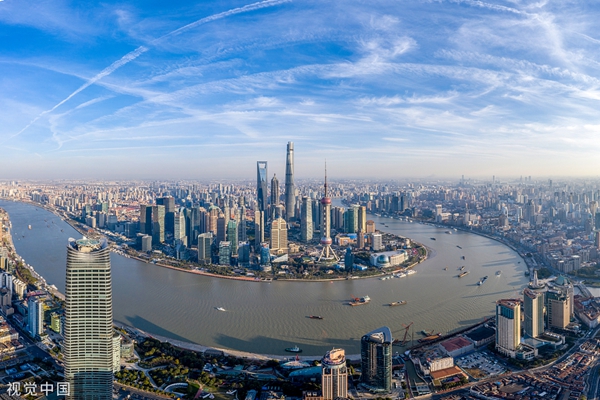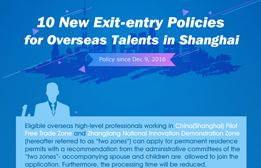Shanghai builds top-notch hub for global talents

A view of the Huangpu River in Shanghai. [Photo/VCG]
An international metropolis that is open, innovative and inclusive, Shanghai is leveraging its business-friendly environment, technological innovation and favorable policies to create a new highland for talents from China and abroad.
Over the past five years, the number of talents in Shanghai has increased by 990,000 to the current 6.75 million. Shanghai has been attracting high-caliber professionals in areas like artificial intelligence, biomedicine and integrated circuits. The city has also been cultivating young outstanding talents and innovating talent introduction models by taking advantage of initiatives like the Magnolia Talent Plan, the Yingcai Talent Plan and the Super Postdoctoral Incentive Plan.
Shanghai's efforts to become a highland for talent from around the world was recently highlighted at the third Shanghai Global Talents Innovation and Entrepreneurship Summit.
Themed "Together We Shine", the summit promoted the deep integration of talent, technology, industry and finance chains and aimed to create an internationally influential platform for talent innovation and entrepreneurship. The summit featured events such as career fairs by top overseas universities, international young scholar forums, venture capital forums, excellent engineer training seminars, entrepreneurship training camps and roadshows.
Shanghai is ramping up efforts to offer comprehensive services and guarantees for all types of talents and building an open, livable and conducive environment in all respects.
Xu Kailiang, a PhD in biomedical engineering from Fudan University, worked at France's Université Pierre et Marie Curie, or UPMC, in 2014. He later became a beneficiary of the Marie Skłodowska-Curie Actions fund from the European Union and worked as a researcher at the Institute Laue-Langevin, or ILL, in Grenoble. Despite having a promising career overseas, he decided to return to China.
"There is huge potential for work and entrepreneurship in China and I am determined to make contributions to the country's innovation and development," said Xu, who is now a researcher and doctoral supervisor at the Center for Biomedical Engineering, Fudan University. He is also the founder of a medical tech company in Shanghai.
"Shanghai is a city with a spirit of 'daring to innovate and take actions'. Working here comes with pressure but also motivation," said Xu, who always carries a tie, a gift from his late mentor Wang Weiqi, with him.
Wang was an expert in biomedical engineering, an academician and a chief professor of Fudan University before he went to the United States on a study mission.
This tie, said Xu, symbolizes the inheritance of mentorship and is also a microcosm of the talent ecosystem in Shanghai - generations of talents work together to create a broader stage for the younger generation.
Xu is selected into the lists of the provincial, ministerial-level and national-level talent plans. "In recent years, hardware conditions for domestic scientific research have improved rapidly and China's robust development has enhanced our confidence. Our generation must and will accomplish key missions," he said.
Through a series of initiatives, Shanghai has expanded its global influence in talent attraction. To date, the city has issued more than 408,000 foreign work permits - about a quarter of the country's total. There are 12,000 foreign talents holding permanent residence permits in Shanghai, the highest in the country. In addition, there are more than 290,000 overseas students who work and start businesses in Shanghai – also the highest in the country.
Shanghai has been named by foreign professionals as the "most attractive Chinese city for foreign talents" for 11 consecutive, and is also home to nearly 2,000 leading talents, including academicians from the Chinese Academy of Sciences and the Chinese Academy of Engineering.
Multiple channels
As a vital platform for talent attraction in Shanghai, the final round of the third Shanghai Global Talents Innovation and Entrepreneurship Competition held in April has played an active role in stimulating vitality in innovation and entrepreneurship and accelerated the gathering of high-level talents who support industrial transformation and upgrading.
Shanghai has also been broadening the channels for talent attraction and creating a stage to help professionals realize their dreams. For instance, authorities have been optimizing existing talent plans to strengthen local talent development and setting up review platforms for education, health and other industry-specific talent plans, thus allowing talents to focus more on scientific research.
Shanghai has been relying on the country's world-class career platforms to attract and cultivate talents. By using major scientific platforms such as the Shanghai Synchrotron Radiation Facility and the Superintense Ultrafast Laser Facility, the city has attracted many top talents and teams specialized in basic cutting-edge fields and core technology research. For example, the Shanghai Synchrotron Radiation Facility has attracted nearly 30,000 scientists from around the world.
The city has also expanded industrial platforms, cultivated several tech enterprises and built an innovative consortia with support from universities and institutes. Additionally, it has optimized technology service platforms to provide low-cost, convenient and professional services to talents and teams.
There are currently more than 600 incubators in Shanghai nurturing more than 24,000 companies.
Innovation with an open mind
Shanghai has over the past four years developed 16 first-class innovative medicines, about one-fourth of the country's total. There are 23 cumulative third-class innovative medical devices, about one-sixth of the national total.
One reason why these achievements exist is the major breakthrough the city has made in the field of basic research, which is closely related to the dynamic changes brought about by institutional and mechanism reforms.
Luo Jiangnan, CEO of Shanghai Puyou Biomedical Co Ltd, said at the third Shanghai Global Talents Innovation and Entrepreneurship Competition that an important reason why Shanghai can be a fertile ground for innovation and entrepreneurship is the city's aptitude for encouraging innovation and tolerating failure.
Shanghai has in recent years simplified administrative approval procedures in talent recruitment and other matters. The city has also established new R&D institutions to build more career development platforms for talents.
Over the past few years, Shanghai has torn down institutional and mechanism barriers, strengthened its talent foundation and built a system where top scientists take responsibility and innovate talent evaluation mechanisms. According to this system, more than 70 percent of the net income from the transfer and transformation of scientific and technological achievements can be used to reward individuals and teams.
In addition, the city has continued to improve the mechanism for cultivating young talents and provides support to about 5,000 outstanding young sci-tech talents each year.
Soft power
Tang Xinmeng, an overseas returnee, is among those who have benefited from Shanghai's talent policies.
Currently a researcher at the International Innovation Center of Tsinghua University in Shanghai, Tang lives in the talent apartment provided by Shanghai's Putuo district and enjoys favorable benefits such as rental subsidies, medical care and education for his children.
In 2022, Shanghai released a policy regarding graduate employment in the city, lowered the threshold for graduate and undergraduate employment and relaxed the restrictions on permanent residence for returnees. Authorities have also launched talent residential projects, improved medical services for talents, boosted the digital transformation of talent work and upgraded urban facilities.
In the coming years, Shanghai will implement more policies and explore talent development mechanisms with both Chinese characteristics and international competitive advantages to draw more talents to the city.

 Print
Print Mail
Mail




